History
2009 – the program for young journalists
2009 – the program for young journalists
Program for socially responsible young journalists began in 2009. It was initiated by the National Institute for Social Integration in response to the deteriorating, myth-based portrayal of the most stigmatized groups of society in the media which incited intolerance and a thriving culture of bullying.
Learning program for young journalists – it is a system that recognizes, motivates, supports, and provides information and empowers talented young journalists to carry out socially responsible activities.
2011 – The Media4Change was formed
2011 – The Media4Change was formed
Neringa Jurčiukonytė, the ambitious head of Media4Change, who does not intend to limit the focus on young journalists, founded the Media4Change program at the National Institute for Social Integration to observe the work of the media and facilitate the improvement of the portrayal of vulnerable groups in society.
The main goal of this program is to strengthen journalistic ethics, inspire the highest standards, and introduce innovative tools in the field of journalism.
2012 – Media4Change started watching media
2012 – Media4Change started watching media
Since 2012, one of the integral parts of Media4Change are activities observing how Lithuanian media portray the groups that face the greatest social distance. Ongoing monitoring has evolved to Ethical Media Awards, monthly and annual reports which are available on the webpage and social media.
Media4Change starts to specialize in the field of hate speech prevention, becomes the coordinator of the “Council of Europe” campaign “No Hate Speech” in Lithuania.
2013 – Media4change launches training programs, attracted over 200 journalists and expands internationally
2013 – Media4change launches training programs, attracted over 200 journalists and expands internationally
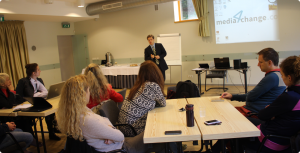
Organized training based on hate speech from legal and sociological perspectives involving over 200 regional journalists. Three international events brought together media representatives from 14 European countries: training for young journalists, training for professional journalists and a discussion in Sardinia, which attracted the largest number of media editors from Lithuania and other partner countries.
2014 – investigative journalism competition
2014 – investigative journalism competition
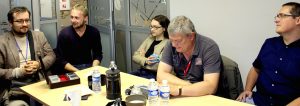
Back in 2014, the Media4Change movement organised the first Lithuanian investigative journalism competition, which encouraged Lithuanian media decision-makers to pay appropriate attention to investigative journalism and to establish the first investigative journalism department.
Started to develop methodologies: “How to recognize hate speech and respond to it appropriately”; “Communication Guide for Vulnerable Groups and for Organizations which are working with it”
2015 – the tradition of the journalistic research competition is continued, media monitoring is renewed.
2015 – the tradition of the journalistic research competition is continued, media monitoring is renewed.
From September 11 to Charlie Hebdo: what is the power of stereotypes created by the media? First time annual summary of media monitoring is presented to society and media. It received a record number of interested people. We presented the tendencies of representation of Roma, Jews and Muslims in the Lithuanian media from June 1, 2013, to July 31, 2014.
The second competition called journalists to go deeper into corruption in politics. Winners of competition show on magazine covers, receive discussions, are invited to radio shows and bring a record stream of audiences to media4change.co webpage.
The Media4Development competition starts and its winners are awarded.
2016 – project of media and information literacy and investigative journalism start-up
2016 – project of media and information literacy and investigative journalism start-up
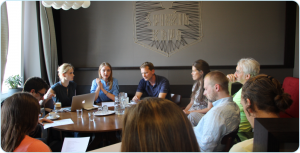
The first media and information literacy projects are launched to develop young people’s critical thinking strategically through opinion leaders: young journalists and youth leaders. Network of opinion leaders extended all over Lithuania, educated over 1000 young people and youth workers.
Media4Change becomes the part of the Council of Europe’s Diversity Accelerator, where the development of a new investigative journalism business model has begun, laying the groundwork for the Future Investigative Story Lab.
2017 – Are launched two two-year projects, Voice4Migrants and Media Literacy and Critical Thinking in Youth Work.
2017 – Are launched two two-year projects, Voice4Migrants and Media Literacy and Critical Thinking in Youth Work.
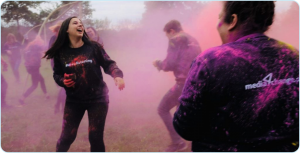
The projects enabled Media4Change to become an important figure in media and information literacy field and in the ethical portrayal of migrants at the European level. The circle of international partners has grown at a record rate of 20.
Neringa Jurčiukonytė, the head of Media4Change, becomes a member of the Media Council. It is an advisory voice to the Ministry of Culture in formulating public information, information security, media and information literacy policy in Lithuania.
2018 – The started projects are being continued, media monitoring is being updated
2018 – The started projects are being continued, media monitoring is being updated
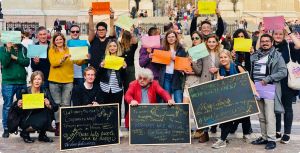
Fundraising for journalists is being launched at a prestigious conference at the London Center for Investigative Journalism.
The Voice4Migrants project accelerates, bringing together an enterprising international team of change agents from 14 European countries, and launching a media and information literacy campaign, “I was told”.
Updated media monitoring, analyzing the most stigmatized groups of society, provided monthly reports.
2019 – Media for all people awards
2019 – Media for all people awards
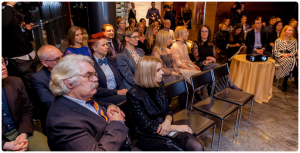
For the first time in Lithuania, ethical media awards were organised. The media that gave space to the most vulnerable groups and followed principles of social responsibility were awarded. The awards were presented on the basis of media research conducted by Media4Change analysts.
Finishes citizens by involving close to a thousand European citizens in the public discourse on media ethics. The international Media4Change team travels to San Sebastian, Budapest and finishes in the final conference in Lithuania.
The completed “Media Literacy and Critical Thinking in Youth Work” project paves the way for another Digital MIL LAB in Youth Work project for opinion leaders.
2020 – Future Story Lab
2020 – Future Story Lab
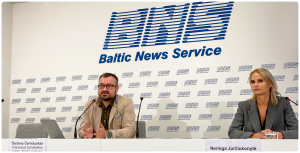
The focus is on journalistic innovation. The most comprehensive public database in Lithuania is being launched, allowing you to quickly and easily see how politicians, high-ranking civil servants and businesses are interconnected, as well as how budget funds and EU investments are used.
A secure drop platform is being set up that allows people to be safe without any email. traces of passing information to journalists.
The foundations are being laid for the first Lithuanian engage journalism project.
Investigative journalism competitions are being updated.
2022 – Media for all people awards and the start of Bendra.lt
2022 – Media for all people awards and the start of Bendra.lt
Once again media outlets that gave voice to the most vulnerable groups and followed principles of social responsibility were awarded. The awards were presented on the basis of media research conducted by Media4Change media monitoring team.
After the awards there was the announcement of the first engaged journalism platform in Lithuania: Bendra.lt

Program for socially responsible young journalists began in 2009. It was initiated by the National Institute for Social Integration in response to the deteriorating, myth-based portrayal of the most stigmatized groups of society in the media which incited intolerance and a thriving culture of bullying.
Learning program for young journalists – it is a system that recognizes, motivates, supports, and provides information and empowers talented young journalists to carry out socially responsible activities.
Neringa Jurčiukonytė, the ambitious head of Media4Change, who does not intend to limit the focus on young journalists, founded the Media4Change program at the National Institute for Social Integration to observe the work of the media and facilitate the improvement of the portrayal of vulnerable groups in society.
The main goal of this program is to strengthen journalistic ethics, inspire the highest standards, and introduce innovative tools in the field of journalism.
Since 2012, one of the integral parts of Media4Change are activities observing how Lithuanian media portray the groups that face the greatest social distance. Ongoing monitoring has evolved to Ethical Media Awards, monthly and annual reports which are available on the webpage and social media.
Media4Change starts to specialize in the field of hate speech prevention, becomes the coordinator of the “Council of Europe” campaign “No Hate Speech” in Lithuania.

Organized training based on hate speech from legal and sociological perspectives involving over 200 regional journalists. Three international events brought together media representatives from 14 European countries: training for young journalists, training for professional journalists and a discussion in Sardinia, which attracted the largest number of media editors from Lithuania and other partner countries.

Back in 2014, the Media4Change movement organised the first Lithuanian investigative journalism competition, which encouraged Lithuanian media decision-makers to pay appropriate attention to investigative journalism and to establish the first investigative journalism department.
Started to develop methodologies: “How to recognize hate speech and respond to it appropriately”; “Communication Guide for Vulnerable Groups and for Organizations which are working with it”
From September 11 to Charlie Hebdo: what is the power of stereotypes created by the media? First time annual summary of media monitoring is presented to society and media. It received a record number of interested people. We presented the tendencies of representation of Roma, Jews and Muslims in the Lithuanian media from June 1, 2013, to July 31, 2014.
The second competition called journalists to go deeper into corruption in politics. Winners of competition show on magazine covers, receive discussions, are invited to radio shows and bring a record stream of audiences to media4change.co webpage.
The Media4Development competition starts and its winners are awarded.

The first media and information literacy projects are launched to develop young people’s critical thinking strategically through opinion leaders: young journalists and youth leaders. Network of opinion leaders extended all over Lithuania, educated over 1000 young people and youth workers.
Media4Change becomes the part of the Council of Europe’s Diversity Accelerator, where the development of a new investigative journalism business model has begun, laying the groundwork for the Future Investigative Story Lab.

The projects enabled Media4Change to become an important figure in media and information literacy field and in the ethical portrayal of migrants at the European level. The circle of international partners has grown at a record rate of 20.
Neringa Jurčiukonytė, the head of Media4Change, becomes a member of the Media Council. It is an advisory voice to the Ministry of Culture in formulating public information, information security, media and information literacy policy in Lithuania.

Fundraising for journalists is being launched at a prestigious conference at the London Center for Investigative Journalism.
The Voice4Migrants project accelerates, bringing together an enterprising international team of change agents from 14 European countries, and launching a media and information literacy campaign, “I was told”.
Updated media monitoring, analyzing the most stigmatized groups of society, provided monthly reports.

For the first time in Lithuania, ethical media awards were organised. The media that gave space to the most vulnerable groups and followed principles of social responsibility were awarded. The awards were presented on the basis of media research conducted by Media4Change analysts.
Finishes citizens by involving close to a thousand European citizens in the public discourse on media ethics. The international Media4Change team travels to San Sebastian, Budapest and finishes in the final conference in Lithuania.
The completed “Media Literacy and Critical Thinking in Youth Work” project paves the way for another Digital MIL LAB in Youth Work project for opinion leaders.

The focus is on journalistic innovation. The most comprehensive public database in Lithuania is being launched, allowing you to quickly and easily see how politicians, high-ranking civil servants and businesses are interconnected, as well as how budget funds and EU investments are used.
A secure drop platform is being set up that allows people to be safe without any email. traces of passing information to journalists.
The foundations are being laid for the first Lithuanian engage journalism project.
Investigative journalism competitions are being updated.
Once again media outlets that gave voice to the most vulnerable groups and followed principles of social responsibility were awarded. The awards were presented on the basis of media research conducted by Media4Change media monitoring team.
After the awards there was the announcement of the first engaged journalism platform in Lithuania: Bendra.lt
